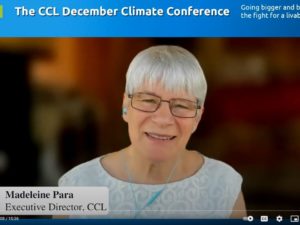
From left, CCL Canada Director Cathy Orlando, volunteer Carole Lavallée and Canadian MP Marc Serré, who recently announced his support for a carbon dividend.
By Mary Gable
On January 1, 2019, the Greenhouse Gas Pollution Pricing Act will take effect across Canada. The legislation requires provinces to either create their own carbon pricing schemes or accept a federal price of $10 Canadian dollars per metric ton of CO2. The fee will reach $50 per metric ton by 2022 and will be revenue-neutral. As it is written, the policy more closely resembles Citizens’ Climate Lobby (CCL)’s proposed Carbon Fee & Dividend than any policy in the world.
The path to this policy has been far from smooth. Nor is the future assured for a Canadian carbon price. Prime Minister Trudeau first announced his intention to implement a national carbon price in 2016 to help meet Canada’s commitments under the Paris Agreement. Since then, province-level policies have been built and scrapped, and Ottawa’s authority to enforce a national price has been challenged. Canada will hold elections in October 2019, and the policy’s future may hang in the balance.
Canada’s carbon pricing journey
So how did we get here? Over the past decade, climate action in Canada has been strongest at the provincial level. British Columbia successfully implemented a revenue-neutral carbon price in 2008. It is considered the “most significant carbon tax in the Western Hemisphere.” In the years since the fee’s implementation, B.C. has outperformed the rest of Canada in reducing emissions, all while growing its economy.
Alberta enacted a similar carbon price in 2017, and Quebec and Ontario have cap-and-trade schemes — for now, anyway. Newly elected Ontario Premier Doug Ford recently said he would end the province’s cap-and-trade program. In Alberta, Premier Rachel Notley declared that her province would pull out of Canada’s climate change agreement after a federal court halted construction on the Trans Mountain oil pipeline. Notley said that Alberta would keep its carbon price at $30 per metric ton in 2021 rather than raising it to meet federal requirements.
Provinces had until September 1 to create their own carbon pricing mechanisms — either a direct price or cap-and-trade — or face the federal price in the new year. The federal policy has two components: the carbon price that will be applied across the economy, and an “output-based” measure that companies in certain industries will pay based on their emissions intensity relative to peers. This could eventually be replaced with a border adjustment to protect companies in trade-exposed sectors. Businesses in most industries are set to pay this extra levy on 20 percent of their emissions, down from an original proposal of 30 percent.
Despite this concession to business, Ontario and Saskatchewan oppose the policy and are challenging the federal government’s right to impose it. However, other leaders believe that this challenge is unlikely to succeed.
Putting party platforms to a vote
Many believe that the federal carbon price will be a key issue in Canada’s 2019 elections, when all 338 MPs in the House of Commons face reelection. Members of Canada’s Conservative party, the largest party in opposition to Trudeau’s Liberal government, have claimed that the federal carbon price would be an economic burden on Canadian families.
A recent study by Clean Prosperity, a non-partisan group, provides powerful evidence to the contrary. According to the group’s modeling, a federal carbon price would save Canadians money. Over five years, the net benefit per average household making $60,000 to $80,000 a year would be $328 in Ontario, $1,231 in Alberta, and $1,711 in Saskatchewan. The National Post, a Conservative-leaning publication, said the study’s findings could “transform the debate” on Canada’s carbon price.
And by the time Canadians go to the polls, they may have already begun receiving dividend checks. Once voters experience this tangible benefit of a carbon price, they may be less likely to vote for politicians promising to take it away.
CCL Canada helps build momentum
For now, it seems that Canada’s carbon pricing advocates have the wind at their backs. They have CCL Canada, among others, to thank. “As Ottawa was developing the federal carbon pricing policy, we held more than 200 meetings, including 100 one-on-one meetings with members of Parliament,” said Cathy Orlando, International Outreach Manager and Director of CCL Canada. “Our members also had over 700 editorials and letters to the editor published last year alone.”
This approach is working: Marc Serré, MP for Nickel Belt, in Ontario, recently announced his support for a dividend. In a press release and a tweet, he thanked CCL members including Carole Lavallée. In her two years as a volunteer, Lavallée has generated dozens of business endorsements in favor of our policy and authored more than 100 letters to the editor. “Carole is a prime example of how one person can create political will and truly make a difference,” Orlando said.
In the months to come, Ottawa will likely release more information about how the federal carbon price will be administered. New data is also expected on Canada’s progress toward emissions reduction and the impact of climate change on the country’s economy — both of which will highlight the need for meaningful action.
At the same time, legal and political opposition is certain to continue — and CCL Canada isn’t letting up on outreach. Volunteers will be lobbying on Parliament Hill during CCL Canada’s fifth annual National Conference, which takes place Oct. 13-16.
Orlando doesn’t think the debate is necessarily cause for alarm. As a diverse federation of provinces and territories, building nationwide consensus in Canada can be a long process, she explains. “For example, it took 31 years for a federal income tax to become permanent policy. And more than 20 years passed between the first province-wide universal healthcare plan and its full adoption across Canada.”
“We’re just a big polite family,” Orlando said. “The hurdles and hiccups we’re facing right now are normal.”
When it comes to climate action, we don’t have decades to spare. But CCL Canada volunteers understand what works within their cultural framework. “Politics is messy — it’s never a straight line,” Orlando said.
“The important thing is that we’re having conversations. If CCL Canada hadn’t been here to help lay the groundwork, I don’t think we’d be where we are now.”





